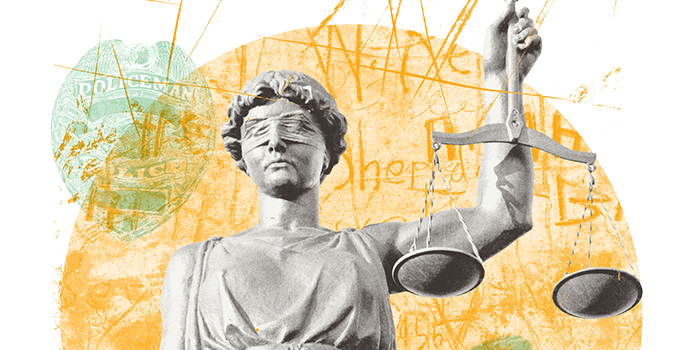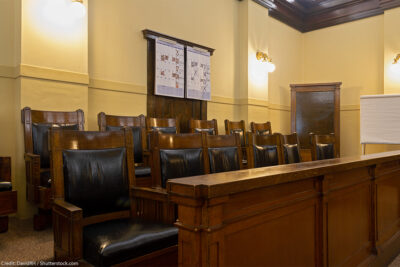
State of Florida v. Luther Douglas & State of Florida v. Donald Banks
Summary
In Duval County, Florida, Luther Douglas, a Black man, faces a possible sentence of death for killing a white woman. In an entirely separate case involving a separate white woman victim, Donald Banks also faces a possible death sentence.
In both cases, the ACLU is challenging the exclusionary and racist practice of death qualification, which will determine who will be able to serve on the juries that decide if Mr. Douglas and Mr. Banks will live or die. Death qualification permits prosecutors and courts to remove people from capital juries who oppose the death penalty, leaving only jurors who promise they can vote for death.
Adopting legal claims initially made in the case of Dennis Glover, the challenges of Mr. Douglas and Mr. Banks rely on a study by Professor of the University of Central Florida, of 12 capital cases in Duval County since 2010 (where 11 out of 12 people on trial were also Black). The study examined the outcome of 800 potential jurors who appeared for jury selection in these cases. Replicating findings from other states and studies, the study found that Black jurors, as well as other jurors of color, were more than twice as likely to be removed as white jurors because by death disqualification.
The evidence submitted in support of this challenge includes:
- A declaration from , a Black Florida death-row exoneree, who recounts Black people being removed from his jury under death qualification, before he was wrongfully convicted for killing a white woman.
- Declarations of Florida attorneys Robert Link and William White who represented , a likely innocent Black man prosecuted by Duval County and executed by the State of Florida for killing a white police officer.
- A declaration from a researcher from the regarding a recent report of the Registry documenting that the burden of wrongful convictions falls disproportionately on Black people, in Florida and beyond.
- Declarations of local historians Professors and , who documented eight racial-terror lynchings in Duval County as part of a community project for and associated with the . Professor Matthews further documents how Florida lynchings transitioned to formal executions similar in many respects, including by targeting Black people. Professor Jamison further documents the use of executions to control slave revolts and the continuing damage and distrust in Florida communities resulting from historical lynchings and ongoing police violence.
- Declaration of Benjamin Frasier, a leader of the , a local civil rights organization, in which Mr. Frasier explains that “my authentic position on the death penalty, and that of other Black Floridians, is born of my experience as a Black person in this state, and stems from law enforcement’s own conduct and discrimination.”
- Declaration of Dr. Kimberly Allen, chief operating officer of , who explains that “distrust of the police, the criminal justice system and other public institutions remain in our community. Just as that distrust and vigilance requires us to have ‘the talk’ with our Black children, it keeps us on guard whenever these institutions are purporting to act in the community’s interest, including when the State asks Black potential jurors to consider certain types of punishments with historical ties to lynching, such as the death penalty.”
- Declaration of Pastor Reginald Gundy of , who raises similar concerns as Mr. Frasier and Dr. Allen, explains his additional authentic faith-based reason for opposing the death penalty, and concludes that his ineligibility to serve on a capital jury “is insulting, and deeply hurts. It is a badge of inferiority unjustly placed upon my by the courts. My viewpoints and voice matter. So do those of my community. I want to serve.”
- Declaration of , who reviewed death sentencing data from Duval County and the State of Florida, and concluded that the death penalty is not administered equally. “Offenders with white victims suffer greater odds of use of the death penalty, but no category of offender and victim is as disadvantaged as a black offender with a white victim. Even this extraordinary rate of 20 percent is then further doubled in those rare cases where the offender is a black male and the victim is a white female.”
- Declaration of the Nation’s foremost expert on the racial divide in the death penalty, who opines that this divide stems from historic and ongoing discrimination and that the “divide is one of the most robust and consistent findings in all of social science.”
A hearing on Mr. Bank and Mr. Douglas’s motion will be held before Judge Kevin A. Blazs in Florida’s Fourth Judicial Circuit Court, on the morning of April 14, 2023.
Legal Documents
-
Declaration of Herman Lindsey -
Robert Link Affidavit -
Affidavit of William White -
Declaration of Jessica Weinstock-Paredes -
David Jamison Declaration -
Scott Matthews Declaration -
Declaration of Benjamin Frazier -
Final Declaration of Dr. Allen -
Pastor Gundy Declaration -
Baumgartner Report & CV -
Declaration James Unnever
Court: Duval County, Florida Circuit Court
Affiliate: Florida
Court: Duval County, Florida Circuit Court
Affiliate: Florida
Court: Duval County, Florida Circuit Court
Affiliate: Florida
Court: Duval County, Florida Circuit Court
Affiliate: Florida
Court: Duval County, Florida Circuit Court
Affiliate: Florida
Court: Duval County, Florida Circuit Court
Affiliate: Florida
Court: Duval County, Florida Circuit Court
Affiliate: Florida
Court: Duval County, Florida Circuit Court
Affiliate: Florida
Court: Duval County, Florida Circuit Court
Affiliate: Florida
Court: Duval County, Florida Circuit Court
Affiliate: Florida
Court: Duval County, Florida Circuit Court
Affiliate: Florida
